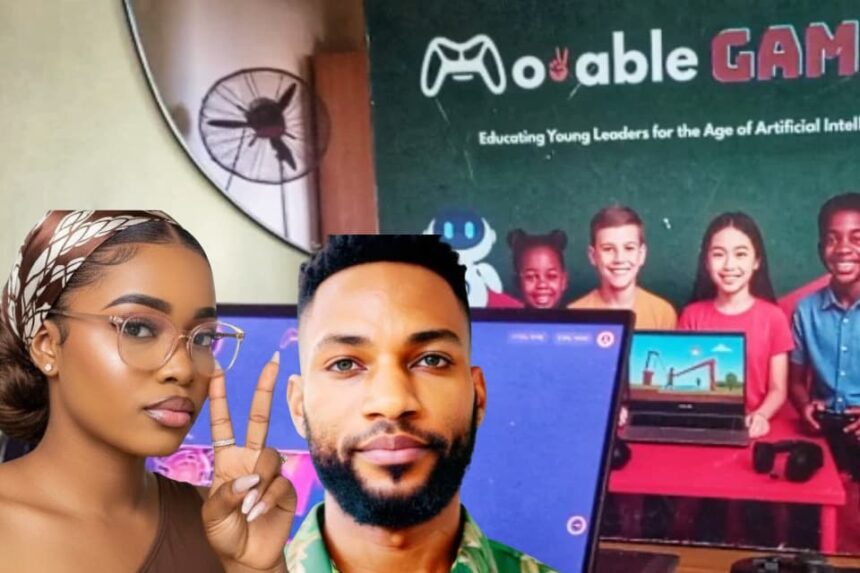Many students struggle to retain knowledge, as traditional classrooms often fail to engage children effectively, particularly in core subjects like Mathematics, English, and Science. Movable Games addresses these challenges by transforming lessons into interactive, game-based experiences.
The platform is designed for students aged 3–12, leveraging AI-powered gameplay and physical gamepads to turn learning into play.
In this edition of Techparley’s DRIVE100, we spotlight Movable Games, founded by Okechukwu David Akahara, which is redefining how young Africans learn by blending AI, neuroscience, and gamified classroom experiences.
“Movable Games solves the problem of low student engagement and low academic performance by transforming traditional classroom lessons into interactive, game-based learning experiences powered by AI and physical gamepads,” Okechukwu told Techparley.
How Movable Games Works
According to the startup, lessons are converted into immersive 2D and 3D games, creating collaborative classroom experiences where students compete, problem-solve, and participate actively.
The platform adapts in real-time to each student’s learning pace, adjusting difficulty, providing feedback, and recommending personalised challenges. Schools use affordable wireless gamepads, eliminating the need for tablets or phones and enabling dynamic, multi-sensory learning.
Students retain knowledge up to three times faster, with measurable improvements in STEM subjects and digital literacy observed in pilot studies. Movable Games aligns with Nigerian, American, and British curricula, offering trial periods for schools at ₦50,000 per class and permanent licences from ₦200,000.
The startup says educators can monitor student performance, assign topics, and access analytics to tailor instruction effectively.
Standing Out in the EdTech Space
Movable Games differentiates itself through a unique combination of AI-driven personalisation, neuroscience-backed gamification, and physical classroom engagement.
Unlike platforms such as Kahoot! or BYJU’s, Movable Games integrates:
- AI Personalisation: Adaptive gameplay to suit each child’s learning style.
- Neuroscience Design: Game mechanics optimised for attention, engagement, and memory retention.
- Physical Classroom Integration: Wireless gamepads encourage collaboration while reducing screen time and costs.
- Performance-Based Model: Schools trial the platform and see measurable improvements before adoption.
“Movable Games uses AI and neuroscience to transform classrooms into interactive gaming arenas where students learn faster, retain knowledge longer, and actively participate — all without requiring expensive devices,” Okechukwu said.
Progress and Traction
Movable Games has already made notable strides in the EdTech space. The startup has secured partnership access with the Federal Ministry of Education, opening doors to over 1,000 schools for potential deployment.
It revealed its games are carefully aligned with the Nigerian, American, and British curricula, ensuring relevance across diverse educational systems.
To date, the founders have invested $35,000 of their own capital to develop and test the platform, and early trials with more than 270 students have demonstrated significant improvements in learning outcomes, particularly in STEM subjects and digital literacy.
Meet the Team
- Okechukwu David Akahara – Founder & CEO: AI and tech expert leading product development.
- Jennifer Uche-Sunday – Co-Founder & CMO: Oversees marketing and product adoption.
- Seun – COO: Operations and logistics expert.
- Michael Akwarandu – CFO: Manages finances and sustainability.
- Yoyo Zhou – Hardware Engineer: Designs gamepad technology and classroom integration.
The team combines global expertise with local insights, forming a cohesive unit capable of tackling the unique challenges of African classrooms.
Vision and Future Goals
In years to come, Movable Games wants to enroll 1,000 schools and engage 2,000 parents, expand adoption through trial programmes and the School of Games initiative, scale across Africa and America, reaching over 1,000,000 parents, and expand the team and refine AI and gamification capabilities.
According to industry leaders, Movable Games is redefining education in Africa by merging AI, gamification, and physical classroom engagement.
By making learning interactive, personalised, and fun, experts say it is not only improving academic outcomes but also preparing students for a digital-first future.
With strong traction, a committed team, and measurable results, tech analysts say Movable Games exemplifies the next generation of African EdTech innovation.
Talking Points
At Techparley, we see Movable Games as a bold solution tackling one of the most persistent challenges in African education: low student engagement and poor learning outcomes in traditional classrooms.
By integrating AI-powered gamification with physical gamepads, Movable Games transforms lessons in Math, English, and Science into interactive, playful experiences. This keeps students aged 3–12 engaged, improves comprehension, and boosts academic performance.
The platform’s AI-driven lesson adaptation and teacher dashboards allow for personalised learning paths and real-time progress tracking, giving educators tools to monitor and support each child effectively.
Early trials with over 270 students have shown measurable improvements in STEM subjects and digital literacy, proving that technology, when thoughtfully designed, can dramatically enhance classroom learning.
Movable Games has the potential to redefine how African students learn, bridging the gap between traditional education and modern, technology-driven learning experiences.
——————-
Bookmark Techparley.com for the most insightful technology news from the African continent.
Follow us on Twitter @Techparleynews, on Facebook at Techparley Africa, on LinkedIn at Techparley Africa, or on Instagram at Techparleynews.





